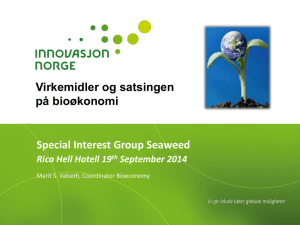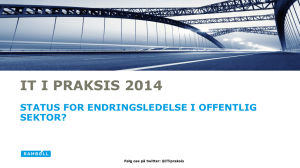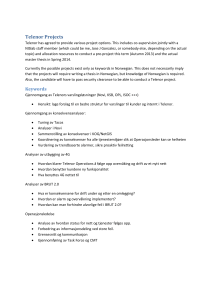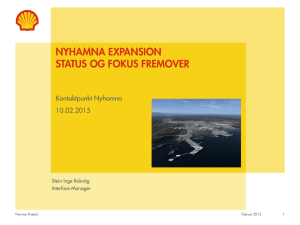Wider economic impacts from R&D investments
advertisement
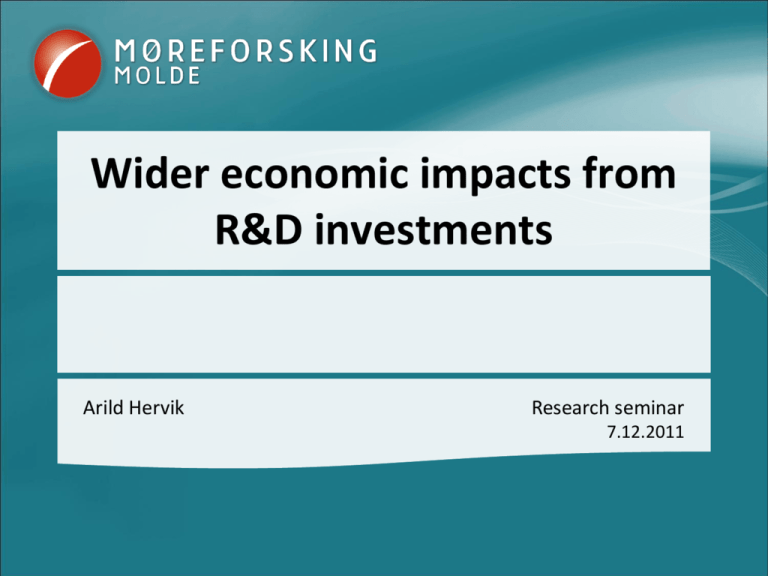
Wider economic impacts from R&D investments Arild Hervik Research seminar 7.12.2011 R&D project over 17 years budget 25 mill from RCN • We deliver every year a report to RCN and a lot of seminars based on the analysis • We deliver information to help the government leading expert committees • We deliver based on our experience to other institutions like Vinnova in Sweden • We deliver by participating in the research system The important elements in R&D policy in most countries • Fiscal incentives like the tax incentive system SkatteFUNN • Direct financial support to firms or R&D institutes as strategic user driven programs • Imperfect capital markets and IN support to innovative start ups • Increased quality in basic university research to support innovative firms Theoretical perspective • Private companies underinvest in R&D because of market imperfections • Outcome from R&D only partially appropriated by innovation firm and the rest is spill over to society lack of incentives • Imperfections in capital markets because of uncertainties and asymmetric information for innovative start ups - lack of means • All countries strong focus on R&D policy Michael Peneder (2008). The problem of private underinvestment in innovation: a policy mindmap, Technovation 28. • 7.12.2011 5 Measuring wider economic impacts from user driven R&D programs • A cost benefit approach from the Mansfield tradition • The conterfactual problem and input -, output and behavioural additionality important • Economic benefits for R&D company estimated • Spill over effects in focus • Measurement problems and add a system of other indicators A module based database • The selection module with systematic data from all projects and a final score 1-7 • Ex ante interviews and a company survey database • Ex post interviews 3 years after start up • Long run interviews 8 years after start up • Output indicators like patents , scientific articles , new firms , new products etc • Pure Market Spillover • Plus Pure Knowledge Spillover • Plus Interaction of the Two Economic Benefit Firm 1 Profits Firm 1 R&D New Knowledge Held by Firm 1 Better Products; Lower Costs Product Market Competition Private Return Customer Benefit Other Firm’s Profit • Patents • Publications • Other New Knowledge Released by Firm 1 Other Firm’s Knowledge • 7.12.2011 Social Return Spillover Gap Better Products; Lower Costs Other Product Markets Other Firm’s Profit Customer Benefit 8 C Social rate of return (profits of all firms plus benefits to consumers) B D A Poor prospects • 7.12.2011 Marginal commercial prospects Good commercial prospects Private rate of return (profits of innovating firms) 9 Socioeconomic costs and benefits – indicator set • Indicators for success within the companies • The conterfactual problem and indicators for additionality • Indicators for private economic costs/benefits • Indicators for eksternal effects • Estimation of socioeconomic benefits Plans for commercialization of R&D projects – long term Already commercialized 48 % Expects commercialization within next two years 17 % Expects commercialization within next five years 7% No plans of commercialization 15 % Not relevant Don't know 9% 4% 0% 10 % 20 % 30 % 40 % 50 % Calculated net present values based on estimates from companies – long term Net present value for all projects measured Net present value for projects with high additionality ex ante Net present value in millions NOK (2009) 3 500 3 000 2 500 2 000 1 500 1 000 500 0 -500 2002 2003 2004 2005 2006 2007 2008 2009 Year of measure 1996-98 1999 2000 2001 2002 2003 2004 2005 Year of completion Socioeconomic effects from 709 projects (1996 – 2005) R&D efforts Socioeconomic returns Socioeconomic returns adjusted for additionality Private returns (expected) 12.7 b NOK High input additionality: 4.0 b NOK Research Council support (2.1 b NOK) Companies’ input (4.8 b NOK) Spillovers 6.9 b NOK Market spillover (26 %) Knowledge spillover (38 %) Indicators of spillovers adjusted for additionality: great potential in about 20 % of the R&D projects Population of 820 user-driven innovation projects Research Council of Norway Grants 2.5 bn NOK Supported firms 8 bn NOK (including RCN support) Indicators from long-term assessment; four years after project completion (Percentages based on interviews of 465 projects in the population) Great significance in 65 % of the projects Competence building Realized 900 innovations in 65 % of the projects Innovation of products and processes Market competition Profit in firms undertaking user-driven R&D Expected NPV 14.8 bn NOK in 41 % of the projects Pecuniary effects * Significant in 30 % of the projects Other firm’s profit Significant in 40 % of the projects Knowledge spillover • Patents • Publications • PhDs • Other Other firm’s knowledge • 7.12.2011 Innovation Other product markets Other firm’s profit Customer benefits * Customer benefits; including cost savings and quality improvements for corporate customers, and consumer benefits 14 The indicator approach • The private profit compensates for all the projects that never reached the market • A few projects (20) have 80% of the profit • Project owners estimates market and knowledge spillovers. • The indicator approach do not result in one figure. It gives an indication that the portfolio have a positive socioeconomic effect in a broad context. Firms estimation of project success – ex post • 7.12.2011 16 Success ex post - regression Dependent variable Number of observations Non missing observations Missing observations Adjusted R2 Constant term Co-operation and network building Competence building Technological results Financial performance 9.9.2011 Total estimation of project success 725 517 208 0,7467 Coefficient -0,29 0,30 0,26 0,27 0,23 t-value -1,65 11,21 6,83 9,5 11,71 Pr > |t| 0,0997 < 0,0001 < 0,0001 < 0,0001 < 0,0001 17 • 7.12.2011 18 Project impact on firm development ex post regression Dependent variable Number of observations Non missing observations Missing observations Adjusted R2 Constant term Co-operation and network building Competence building Technological results Financial performance 9.9.2011 Total estimation of project impact 725 554 171 0,8564 Coefficient 0,31 0,15 0,32 0,25 0,25 t-value 3,40 7,56 11,52 10,78 14,39 Pr > |t| 0,0007 < 0,0001 < 0,0001 < 0,0001 < 0,0001 19 Firms satisfaction with performance and results long term R&D (red) and commercialization (blue) Forskningsmessige og kommersielle resultater (n=103) Forskningsmessige prestasjoner og resultater Kommersielle prestasjoner og resultater 100 % 80 % 61 % 60 % 37 % 40 % 28 % 25 % 20 % 12 % 9% 7% 4% 5% 6% 6% 1% 0% Svært fornøyd Fornøyd Nøytral Misfornøyd Svært misfornøyd Vet ikke Ikke relevant Langsiktig resultatmåling av BIP-prosjekter med avslutning 2005-2006 9.9.2011 20 Research level of projects – firms judgement Forskningsinnhold i prosjektene vurdert av bedriftene 100 % 80 % 5% 5% 7% 7% 29 % 27 % 18 % 19 % 24 % 26 % 40 % 60 % 30 % 28 % Score 1-3 Score 4 (Anvendt forskning) 32 % 40 % 36 % 20 % 25 % 32 % 27 % Score 5 Score 6 Score 7 (Front/leading edge) 16 % 12 % 13 % 11 % 14 % 16 % 2000-2009 2007-2009 2007 2008 2009 (n=952) (n=329) (n=128) (n=99) (n=102) 0% BIP-prosjekter med oppstart 2000-2009 9.9.2011 21 External effects (PhD, publications and patents) - long term Long term measurements of R&D-projects, terminated 2005-2006 (n=102) PhD (#) Publications w/referee (#) Patent (#) Expectations - PROVIS 27 - - Reports from firms (tellekanter) at closing 7 70 30 Reports from firms 4 yrs later 9.9.2011 25 211 52 (+36 applications) 22 • 7.12.2011 23 Assessment of socioeconomic benefits – long term – externalities – market spillovers Cost savings or quality improvements in other firms 25 % Increased benefits for consumers and endusers 31 % Score 6 - 7 Diffusion of knowledge through co-operation 8% and labour mobility Score 4 - 5 Score 1 - 3 Diffusion of technology through patents or imitation Not relevant Don't know Environmental improvement 17 % Overall benefits to others 26 % 0% 20 % 40 % 60 % 80 % 100 % Research findings and know-how from the project known to others – long term – knowledge spillover 100 % 80 % 60 % Don't know Score 1 - 3 Score 4 - 5 Score 6 - 7 40 % 38 % 20 % 19 % 0% Research findings Know-how The R&D projects importance to company development (long term – 8 yrs) 22 % Growth Survival 20 % Competitive power 36 % Productivity Score 4 - 5 Score 3 18 % Development of expertise Score 1 - 2 67 % Not relevant 47 % New technology Collaboration with R&D institutions 45 % Collaboration with other companies 32 % 0% 20 % 40 % 60 % 80 % 100 % Assessment of input additionality – start up 100 % 80 % 60 % 40 % Don't know 45 % 48 % 50 % 2000-08 2006-08 52 % 55 % 45 % High 20 % 0% 1995-2008 2006 Low Medium 2007 2008 Asssessment of behavioural additionality – start up 67 % Realization of the project Development of collaboration with R&D institutions 47 % Development of R&D collaboration with other companies 32 % Score 6 - 7 Score 4 - 5 Score 1 - 3 24 % Diffusion of R&D results Not relevant Don't know 25 % From short to long term R&D effort Possibility of larger projects or wider scope in R&D effort 44 % Upgrading internal R&D expertise (2008) 44 % 0% 20 % 40 % 60 % 80 % 100 % • 7.12.2011 29
